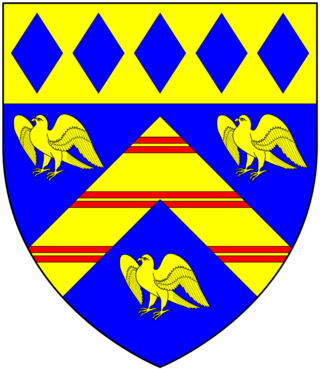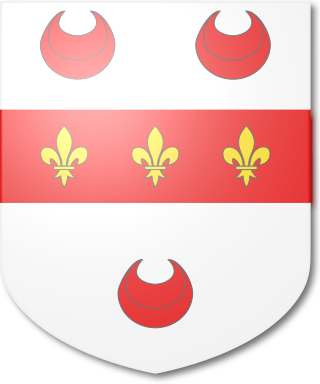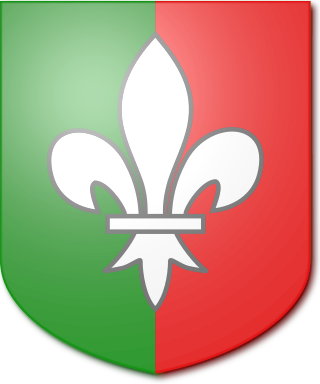
Baron Roborough, of Maristow in the County of Devon, is a title in the Peerage of the United Kingdom. It was created on 24 January 1938 for Sir Henry Lopes, 4th Baronet. He had earlier represented Grantham, Lincolnshire, in Parliament as a Conservative. The Baronetcy, of Maristow House in the County of Devon, had been created in the Baronetage of the United Kingdom on 1 November 1805 for Manasseh Masseh Lopes, a member of a wealthy family of Portuguese Jewish origin, with special remainder to his nephew Ralph Franco, son of his sister Maria. Manasseh Masseh Lopes converted to Christianity in 1802, and later represented Evesham, in Worcestershire, Barnstaple in Devon, and Westbury in Somerset, in Parliament. However, in 1819 he was twice convicted of bribing the voters in both Barnstaple and Grampound in order to be elected to Parliament, and was sentenced to imprisonment and heavy fines. He was also unseated by the House of Commons, but after his release from prison he nonetheless got elected for Westbury, a pocket borough which he controlled to a great extent.

The Eliott Baronetcy, of Stobs in the County of Roxburgh, is a title in the Baronetage of Nova Scotia. It was created on 3 December 1666 for Gilbert Eliott. The second baronet was a member of the pre-union Parliament of Scotland. The third Baronet sat as Member of Parliament for Roxburghshire. The Eliott Baronets share a common early Elliot ancestry with the nearby Earls of Minto (Elliot). It is thought that the surname spelling differences were contrived to differentiate the branches.

The Bagge Baronetcy, of Stradsett Hall in the County of Norfolk, is a title in the Baronetage of the United Kingdom. It was created on 13 April 1867 for William Bagge, Conservative Member of Parliament for West Norfolk. The sixth Baronet was Chairman of the West Norfolk District Council between 1976 and 1977.

The Crisp Baronetcy, of Bungay in the County of Suffolk, is a title in the Baronetage of the United Kingdom. It was created on 5 February 1913 for the lawyer and microscopist Sir Frank Crisp.

The Hammick Baronetcy, of Cavendish Square, London, is a title in the Baronetage of the United Kingdom. It was created on 25 July 1834 for the noted surgeon and physician Stephen Hammick.

The Oakeley Baronetcy, of Shrewsbury, is a title in the Baronetage of Great Britain. It was created on 5 June 1790 for the Indian administrator Charles Oakeley. He served as Governor of Madras from 1790 to 1794. Frederick Oakeley was the second son of the first Baronet.

The Currie Baronetcy is a title in the Baronetage of the United Kingdom. It was created on 11 January 1847 for Frederick Currie, Foreign Secretary to the Indian Government and a member of the Supreme Council of India. He was a grandson of William Currie (1721–1781), nephew of William Currie (1756–1829), who was Member of Parliament for Upper Gatton and Winchelsea, and the brother of Vice-Admiral Mark John Currie.

The Fowke Baronetcy, of Lowesby in the County of Leicester, is a title in the Baronetage of the United Kingdom. It was created on 7 February 1814 for Frederick Gustavus Fowke of Lowesby Hall, Lowesby, near Leicester. He was the son of Lieutenant-General Sir Thomas Fowke, Groom of the Bedchamber to the Duke of Cumberland. His grandfather was Lieutenant-General Thomas Fowke, Governor of Gibraltar. The family surname is pronounced "Foke".

The Wraxall Baronetcy, of Wraxall in the County of Somerset, is a title in the Baronetage of the United Kingdom. It was created on 21 December 1813 for Nathaniel Wraxall. He was in the East India Company Civil Service, an author and member of parliament for Hindon, Ludgershall and Wallingford. His grandson, the third Baronet, was an author.

The Farrington Baronetcy, of Blackheath in the County of Kent, is a title in the Baronetage of the United Kingdom. It was created on 2 December 1818 for General Sir Anthony Farrington, 1st Baronet.

The ffolkes Baronetcy, of Hillington in the County of Norfolk, is a title in the Baronetage of Great Britain. It was created on 26 May 1774 for Martin ffolkes, FRS later High Sheriff of Norfolk and Member of Parliament for King's Lynn. The second Baronet represented Norfolk and Norfolk West in the House of Commons while the third Baronet represented King's Lynn. The fifth Baronet was Honorary Chaplain to Queen Victoria, Chaplain-in-Ordinary to Edward VII and George V and Chaplain to Edward VIII and George VI.

The Elton Baronetcy, of Bristol, is a title in the Baronetage of Great Britain. It was created on 31 October 1717 for Abraham Elton, Mayor of and Member of Parliament for Bristol from 1722 to 1727. The second Baronet was also Mayor of Bristol and represented Taunton and Bristol (1727–1742) in the House of Commons. The seventh Baronet sat as Liberal Member of Parliament for Bath. The eighth Baronet was High Sheriff of Somerset in 1895. The tenth Baronet was a pioneer of the British documentary film industry.

The Milman Baronetcy, of Levaton-in-Woodland in the County of Devon, is a title in the Baronetage of Great Britain. It was created on 28 November 1800 for Francis Milman, Physician-in-Ordinary to King George III and President of the Royal College of Physicians. The seventh Baronet was a brigadier-general in the British Army.

The Fleming, later le Fleming Baronetcy, of Rydal in the County of Westmorland, is a title in the Baronetage of England. It was created on 4 October 1705 for William Fleming, Member of Parliament for Westmorland. The second Baronet was Bishop of Carlisle. The third Baronet represented Cumberland in the British House of Commons. The fourth Baronet was Member of Parliament for Westmorland. He assumed the surname of le Fleming, an ancient version of the family surname. This version of the surname has also been borne by the Baronets from the seventh Baronet onwards. The sixth Baronet, an ordained priest, served as Rector of Windermere.

The Mills Baronetcy, of Ebbw Vale in the County of Monmouth, was created in the Baronetage of the United Kingdom in 1921 for the industrialist and Conservative Member of Parliament Frederick Mills. The second Baronet was Director of Public Works of Sierra Leone between 1939 and 1942 and of Uganda between 1942 and 1947.

The Palmer Baronetcy, of Carlton in the County of Northampton, was created in the Baronetage of England on 7 June 1660 for the lawyer and politician Geoffrey Palmer. The second Baronet was Member of Parliament for Higham Ferrers. The third, fourth and fifth Baronets all represented Leicestershire in the House of Commons. The fifth Baronet served as High Sheriff of Leicestershire in 1782 and the eighth Baronet as High Sheriff of Northamptonshire in 1871.

The Hudson, later Palmer Baronetcy, of Wanlip Hall in the County of Leicester, was created in the Baronetage of Great Britain on 28 July 1791 for Charles Grave Hudson, a Director of the South Sea Company and High Sheriff of Leicestershire in 1784. In 1813 the second Baronet assumed by royal sign-manual the surname of Palmer in lieu of his patronymic on succeeding to the estates of his maternal grandfather, Henry Palmer, of Wanlip. The title vests in its ninth holder.

The Palmer Baronetcy, of Grinkle Park in the County of York and of Newcastle upon Tyne, was created in the Baronetage of the United Kingdom on 31 July 1886 for Charles Palmer, a coal and shipping magnate and Liberal politician. The third Baronet, residing at Walworth Castle was High Sheriff of Durham in 1915. The title vests in its fifth holder.
The Robinson Baronetcy, of London, was created in the Baronetage of England on 22 June 1660 for John Robinson, Lord Mayor of London and Member of Parliament for the City of London and Rye. He was the nephew of Archbishop William Laud. The fifth and sixth Baronets both represented Northampton in the House of Commons.

The Robinson Baronetcy, of Toronto in Canada, was created in the Baronetage of the United Kingdom on 21 September 1854 for the Canadian lawyer and politician John Robinson.



















